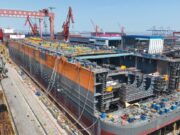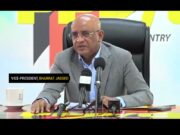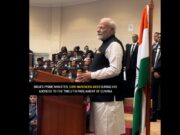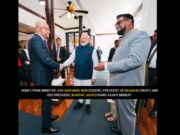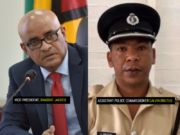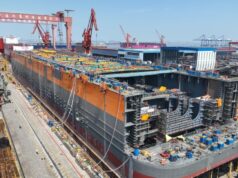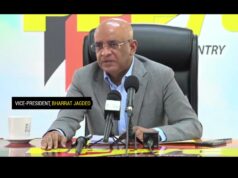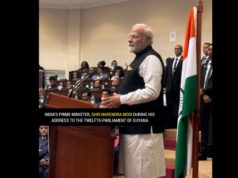By Abena Rockcliffe
On Friday the International Court of Justice (ICJ) ruled that pending its final decision on the Guyana/ Venezuela border controversy, Venezuela shall refrain from any action that affects Guyana’s control over the Essequibo. This is a win for Guyana. Such a provisional measure is exactly the kind of protection the country sought when it petitioned the court.
As many expected, the court’s decision did not alter Venezuela’s course along troubling waters. The country’s President, Nicolas Maduro said that, true to her historical position, Venezuela will basically ignore the court. He encouraged his people to turn out in their numbers and vote for all five questions put to them in the Referendum being voted today. This includes the question regarding annexation of the Essequibo which rightfully belongs to Guyana.
Taking note of Maduro’s posture, many Guyanese remain worried, scared even. That worry is not misplaced; Maduro seems to be operating in the absence of reason and seems willing to jeopardize the peace of the region for his selfish purposes as he prepares for elections next year. But it is important for Guyanese citizens to heed the call of President Dr. Irfaan Ali. Now is definitely the time to remain calm and, as cliché as this term has become, trust the process.
Guyana’s message to her citizens has been consistent and the overall posture of the government can be described as ‘hoping for the best, expecting the worst.’ Therefore, Guyanese must trust that preparation is being made for the protection of Guyana in the face of any unwanted eventuality.
DIPLOMACY AND LAW
Guyana has maintained that her first line of defence remains diplomacy and the rule of international law.
President Dr. Irfaan Ali and Vice President, Dr. Bharrat Jagdeo have been working the diplomatic stage hard. The President, Vice President and team of diplomats have been able to garner tremendous support for Guyana. Not a single internationally recognized body, like the Organization of American States (OAS), Commonwealth, United Nations or Caricom has come out in support of Venezuela, they have all supported Guyana. In short, Guyana has the diplomatic community on her side.
Historically, and even today, the country has international law on her side. Guyana’s court case at the ICJ remains strong and that is the main reason she prefers to settle the controversy legally while Venezuela remains hell bent on an outside process. Venezuela simply has no legal ground on which she can stand. Based on the provisional measure granted by the court, any attempt by Venezuela to seize Guyana’s Essequibo will violate the court order, and the effects will be far reaching. The enforcement arm of the ICJ is the United Nation Security Council. When a country violates an ICJ order, the Council may “issue a ceasefire directive, dispatch military observers or a peacekeeping force. If this is not enough, the Security Council can opt for enforcement measures, such as economic sanctions, arms embargos, financial penalties and restrictions, travel bans, the severance of diplomatic relations, a blockade, or even collective military action.” [https://www.un.org/en/our-work/protect-human-rights#:~:text=If%20this%20is%20not%20enough,or%20even%20collective%20military%20action](https://www.un.org/en/our-work/protect-human-rights#:~:text=If%20this%20is%20not%20enough,or%20even%20collective%20military%20action “”).
STRENGTH OF THE BULLY
But if, in Guyanese parlance, push comes to shove, and the weight of the international community and an ICJ ruling are not enough to keep Venezuela at bay, the commitment of Dr. Jagdeo is that Guyana will mount defence and “…will use all allies to do so, including the United States.”
The main reason most Guyanese fear is because it is no secret that the nation’s military is by no means considered top notch and Venezuela has been historically known as the state armed with submarines, fighter jets, war tanks etc.
The reality is that while Guyana wants—more than anything—to avoid military conflict, the nation is not defenseless and the bullying neighbour is not as strong as before.
The Guyanese public does not know the extent to which Guyana’s allies are willing to go to protect her patrimony. The help of the US can come in the form of sanctions, man power and, or military gears and equipment. That is yet to be seen.
But what is already known is Venezuela is a shell of its former self on many fronts. It is no secret that the national purse is not nearly as full as it used to be. Actually, that is a euphemism, the plain reality is that Venezuela is broke. The effects of its financial crisis have not escaped its military and despite the fact that Maduro’s administration prioritizes keeping the army happy, the weakening state has been inevitable.
During her days of prosperity, Venezuela prioritized strengthening her military and acquiring all sorts of equipment. But even back then, when money was available and the people were not starving, Venezuela was having a hard time maintaining her military fleet.
America’s CIA had compiled a report, “Implications of the Falklands conflict for territorial disputes in Latin America.” The report, though approved for release in 2007, gathered data available as of August 1982.”
That report stated that “even with a large portion of its military budget allocated to maintenance, Venezuela is hard pressed to keep its equipment functioning.” High ranking officials in Venezuela back then admitted that the army could sustain operations outside of the county only for a few days. Much has deteriorated since those days when money was available for maintenance and Venezuela had access to spare parts sold by Americans as that was before the heavy sanctions were placed and relations with Venezuela weren’t frowned upon.
The fighter jets, initially bought from US sources, are believed to have been grounded.
Global Security states, “…Venezuela’s decision to purchase the aircraft (from China in 2008) was driven in part by its inability to purchase US fighters, or spare parts for its existing fleet of US aircraft, as well as successful US efforts to block other Western countries from selling to Venezuela similar aircraft that incorporated US technology.”
Global Security noted, “(Hugo) Chavez in 2013 marked an end to the era of major investments in military modernization.” That body further stated that Maduro had made initial preparations to buy equipment from Russia but could not finish the deal due to lack of funds. [https://www.globalsecurity.org/military/world/venezuela/airforce-modernization.htm](https://www.globalsecurity.org/military/world/venezuela/airforce-modernization.htm “smartCard-inline”)
The submarines are widely considered no longer operable. In May 2020, none other than Forbes Magazine reported, “In the last few years there has been very little public information on Venezuela’s submarines. This may indicate problems with serviceability, possibly tied to Venezuela’s worsening economic and political state.”[https://www.forbes.com/sites/hisutton/2020/05/08/the-mystery-of-the-venezuelan-navys-submarines/?sh=1675df6a3b1d](https://www.forbes.com/sites/hisutton/2020/05/08/the-mystery-of-the-venezuelan-navys-submarines/?sh=1675df6a3b1d “smartCard-inline”)
Aside from the lack of functioning equipment, Venezuela’s army is said to be organizationally dysfunctional.
In July 2019, Reuters reported, “Many lower-ranking soldiers, destitute and desperate like most of Venezuela’s working class, have deserted the military in recent years, joining at least 4 million other fellow emigres seeking a better life elsewhere. But few senior officers have heeded the opposition’s call for rebellion, leaving the armed forces top-heavy, unwieldy and still standing by Maduro.” [https://www.reuters.com/investigates/special-report/venezuela-military/](https://www.reuters.com/investigates/special-report/venezuela-military/ “smartCard-inline”)
Venezuelan opposition members have been quoted referring to the army as a bureaucratic and operational mess.
In summary, Guyana has international law on its side. Guyana has shown itself not to be the aggressor and thus has secured the overwhelming support of the international community. And, propped by its allies and developmental partners, Guyana’s military defence may indeed be stronger than imagined.
Venezuela has a weak court case, few friends willing to outrightly support her greed and bullyism and is not as military strong as its postures. That is not to be understood as weak. Venezuela has tremendous manpower and even in its weakened state, Venezuela’s military remains at least 10 times stronger than Guyana. But Guyana is not without defence and it will be extremely difficult for Venezuela to fund a sustained war or invasion with further economic sanctions. Further, Guyanese will not know the extent of help offered by allies unless that time comes. If significant help is offered, Guyana may very well be stronger even military wise than anticipated.
Given all she has on her side, Guyana’s children need not be consumed by fear.
Guyanese should be cautious, as the actions of a man whose back is against the wall are not always predictable; and, the patriotic support Maduro is getting from his citizens due to the border controversy seems to be his only hope.
Guyanese should pray for the safety of the men on the frontline; but Guyanese need not feel bewildered for the nation is well positioned.
